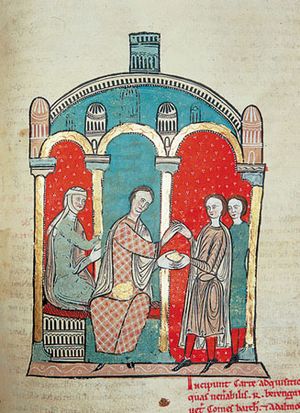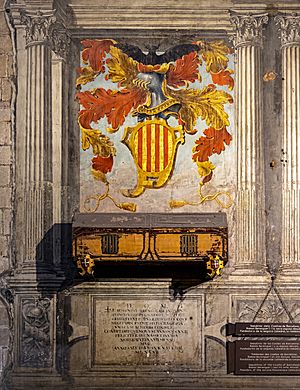Ramon Berenguer I, Count of Barcelona facts for kids
Quick facts for kids Ramon Berenguer I the Old |
|
|---|---|
 |
|
| Ramon Berenguer I and his wife, Almodis de la Marche, counting out 2000 ounces of gold coins as payment to William Raymond and Adelaide, count and countess of Cerdagne, in return for their rights over Carcassonne in 1067. | |
|
|
|
| Reign | 1035–1076 |
| Predecessor | Berenguer Ramon I |
| Successor | Ramon Berenguer II and |
| Spouse(s) | Elisabeth of Narbonne Blanca of Narbonne Almodis de la Marche |
| Issue | |
| Peter Raymundi Ramon Berenguer II, Count of Barcelona Berenguer Ramon II, Count of Barcelona Agnes Sancha |
|
| Noble family | Barcelona |
| Father | Berenguer Ramon I the Crooked |
| Mother | Sancha Sanchez |
| Born | 1023 |
| Died | 26 May 1076 |
| Burial | Barcelona Cathedral |
Ramon Berenguer I (born 1023 – died 26 May 1076) was known as the Old (in Catalan: Catalan: el Vell, in French: French: le Vieux). He was the Count of Barcelona from 1035 to 1076. He is famous for creating the first written laws for Catalonia, called the Usages of Barcelona.
Contents
Becoming Count of Barcelona
Ramon Berenguer I was born in 1023. He became Count of Barcelona in 1035 after his father, Berenguer Ramon I the Crooked, passed away. During Ramon Berenguer's time, Barcelona became the most important county among all the other Catalan counties.
Expanding His Lands and Power
Ramon Berenguer I was a strong leader. He led campaigns against the Moors, who were Muslim rulers in Spain. He expanded his lands to the west, reaching a place called Barbastro. He also made other Moorish cities pay him large amounts of money, known as parias (tributes).
Historians believe these tributes helped bring a lot of wealth to Catalonia for the first time. During his rule, Catalonia's power at sea also grew in the western Mediterranean Sea. Ramon Berenguer the Old was also the first count from Catalonia to gain control of lands and influence north of the Pyrenees mountains, including the counties of Carcassonne and Razés.
Creating New Laws
One of Ramon Berenguer's biggest achievements was starting to write down the laws of Catalonia. These laws were called the Usatges of Barcelona. This collection of laws became the first complete set of feudal laws in Western Europe. Feudal law was a system where land was exchanged for loyalty and service.
The count wanted to organize and control the way society was changing. The Church also helped by creating something called the Peace and Truce of God. This was an agreement to stop fighting among different lords and groups in a region for a certain time. The idea of the Truce of God first appeared in Catalonia in 1027, during his father's rule.
His Marriages and Family
Ramon Berenguer I had three wives. While he was still married to his second wife, Blanca, he became involved with Almodis de La Marche. She was the wife of the Count of Toulouse. Ramon and Almodis quickly married each other. Because of this, the Pope Victor II removed them from the Church, a process called excommunication.
Ramon Berenguer I and his third wife, Almodis, also started building a new cathedral in Barcelona. This new Romanesque cathedral replaced an older church that was likely destroyed by Almanzor. Today, you can still see their velvet and brass-bound wooden coffins in the Gothic cathedral that was later built in its place.
After Ramon Berenguer I passed away, his twin sons, Ramon Berenguer II and Berenguer Ramon II, became the next counts.
Children of Ramon Berenguer I

- With his first wife, possibly Isabel:
- Berenguer (died young)
- Arnau (died young)
- Peter Raymundi (1050–1073?): He was exiled.
- With his second wife, Blanca of Narbonne:
- No children listed.
- With his third wife, Almodis de La Marche:
- Ramon Berenguer II the Towhead (1053/54–1082)
- Berenguer Ramon II the Fratricide (1053/54–1097)
- Agnes: She married Guigues II of Albon.
- Sancha: She married William Raymond, who was the count of Cerdanya.
More About Ramon Berenguer I
| Preceded by Berenguer Ramon I |
Count of Barcelona (Barcelona, Girona and Manresa) 1035–1076 |
Succeeded by Ramon Berenguer II and Berenguer Ramon II |
| Preceded by Guisla of Lluçá and William I |
Count of Osona 1054–1076 |
Succeeded by Ramon Berenguer II and Berenguer Ramon II |
| Preceded by Garsenda I Ermengarde I and Adelaide I |
Count of Carcassonne (Carcassonne and Razès) 1069–1076 |
Succeeded by Ramon Berenguer II and Berenguer Ramon II |
See also
 In Spanish: Ramón Berenguer I para niños
In Spanish: Ramón Berenguer I para niños
 | May Edward Chinn |
 | Rebecca Cole |
 | Alexa Canady |
 | Dorothy Lavinia Brown |

